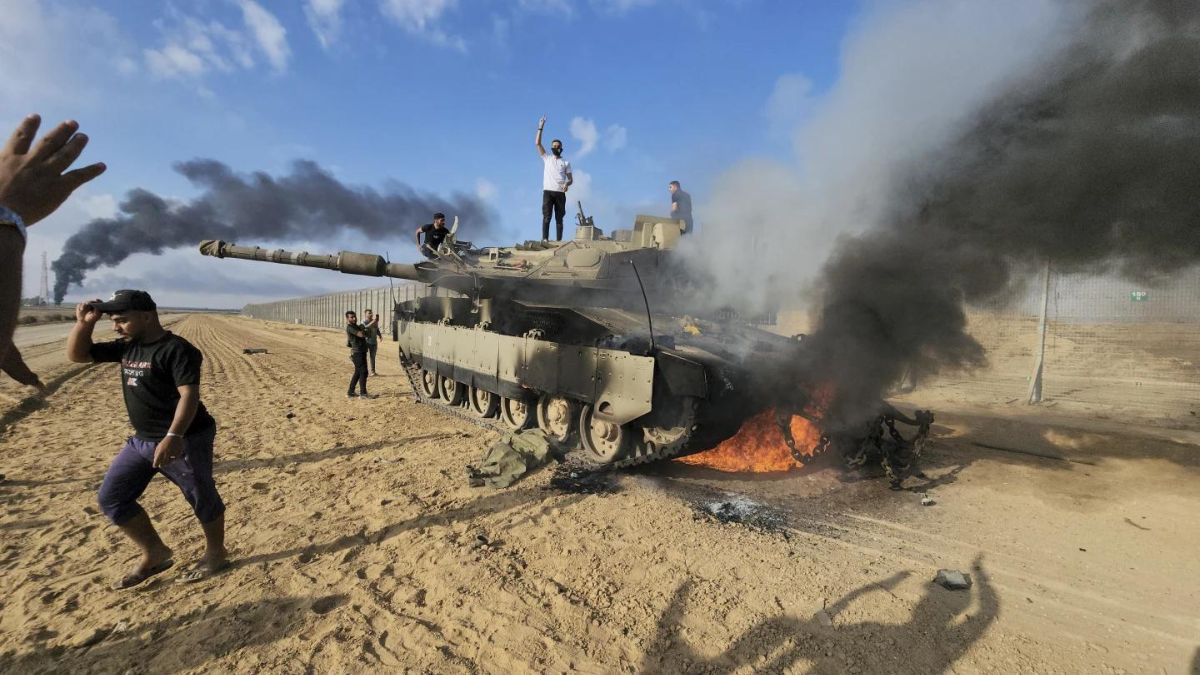Israel-Hamas war: In the early hours of Saturday, Hamas militants infiltrated the border regions and carried out unprecedented and what is termed as "brutal attacks" on Israel by air, land and sea. Millions of Israelis in the country's south awoke to the searing sound of incoming rockets and the inevitable thud of impact. Air raid sirens wailed as far north as Tel Aviv. Israel’s anti-rocket interceptors thundered in Jerusalem.
In an unprecedented escalation, armed Hamas fighters blew up parts of Israel’s highly fortified separation fence and strode into Israeli communities along the Gaza frontier, terrorising residents and trading fire with Israeli soldiers. Israeli Prime Minister Benjamin Netanyahu and his far-right allies were scrambling to respond to the rapidly changing events. As the day wore on, the casualties quickly mounted. As of now, at least 1,600 people have been killed on both sides, with Palestinian authorities claiming 700 casualties on their side.
Here are some key takeaways from the multi-pronged attack that has suddenly plunged Israel and Gaza into battle.
What is Hamas?
Hamas-- an acronym for Harakat al-Muqawama al-Islamiya or Islamic Resistance Movement"-- is a terrorist organisation and one of the Palestinian territories which governs more than two million Palestinians in the Gaza Strip. According to the Council on Foreign Relations, the terror group was founded by Sheikh Ahmed Yassin.
Originally, a Palestinian national and cleric, became an activist in local branches of the Muslim Brotherhood after dedicating his early life to Islamic scholarship in Cairo.
Initially, multiple reports claimed he preached and performed charitable work in the West Bank and Gaza during the 1960s but, later, he established "Hamas" as the political wing in Gaza in December 1987. In its first chartered in 1987, the organisation called for the destruction of Israel and the establishment of an Islamic society in historic Palestine.
It first employed suicide bombing in April 1993, and later it carried multiple attacks on Israel. This prompted the United States and Europe to designate it as a foreign terrorist organization.
Deep-rooted political connection
Hamas won the 2006 parliamentary elections and in 2007 violently seized control of the Gaza Strip from the internationally recognized Palestinian Authority. The Palestinian Authority, dominated by rival Fatah movement, administers semi-autonomous areas of the Israeli-occupied West Bank.
Israel responded to the Hamas takeover with a blockade on Gaza, restricting the movement of people and goods in and out of the territory in a step it says is needed to keep the group from developing weapons. The blockade has ravaged Gaza’s economy, and Palestinians accuse Israel of collective punishment. Over the years, Hamas received backing from Arab countries, such as Qatar and Turkey. Recently, it’s moved closer to Iran and its allies.
Who leads Hamas?
Yassin, who was known as a "spritual leader", was a paralyzed man who used a wheelchair and spent years in Israeli prisons and oversaw the establishment of Hamas’ military wing, which carried out its first suicide attack in 1993.
Israeli forces have targeted Hamas leaders throughout the years, killing Yassin in 2004. Khaled Mashaal, an exiled Hamas member who survived an earlier Israeli assassination attempt, became the group’s leader soon after.
Yehia Sinwar, in Gaza, and Ismail Haniyeh, who lives in exile, are Hamas’ current leaders. They realigned the group’s leadership with Iran and its allies, including Lebanon’s Hezbollah. Since then, many of the group’s leaders relocated to Beirut.
Why Hamas is carrying out brutal attacks on Israel?
Hamas has always espoused violence as a means to liberate occupied Palestinian territories and has called for the annihilation of Israel.
Hamas has carried out suicide bombings and over the years fired tens of thousands of increasingly powerful rockets from Gaza into Israel. It also established a network of tunnels running from Gaza to Egypt to smuggle in weapons, as well as attack tunnels burrowing into Israel.
In recent years, Hamas had appeared to be more focused on running Gaza than attacking Israel.
What happened in recent times?
In recent years, Israel has made peace deals with Arab countries without having to make concessions in its conflict with the Palestinians. The US has recently been trying to broker a deal between Israel and Saudi Arabia, a bitter rival of Hamas’ Iranian backers.
Meanwhile, Israel’s new far-right government was working to cement Israeli settlements in the West Bank despite Palestinian opposition.
Hamas leaders say an Israeli crackdown on militants in the West Bank, continued construction of settlements — which the international community considers to be illegal — thousands of prisoners in Israeli jails, and its ongoing blockade of Gaza pushed it to attack.
Its leaders say hundreds of its 40,000 fighters took part in the assault. Israel says the group has about 30,000 fighters and an arsenal of rockets, including some with a range of about 250 kilometres, and unmanned drones.
What's next?
Israel and Hamas have fought four wars and exchanged fire numerous times since the Islamic militant group seized control of Gaza from forces loyal to the Palestinian Authority in 2007. Cease-fires have stopped major fighting in past rounds of conflict but have always proven shaky.
Each agreement in the past has offered a period of calm, but the deeper, underlying issues of the conflict are rarely addressed and set the stage for the next round of airstrikes and rockets.
With its increased leverage in this round, Hamas is likely to push harder for concessions on key issues, such as easing the blockade and winning the release of prisoners held by Israel.
(With inputs from agency)

